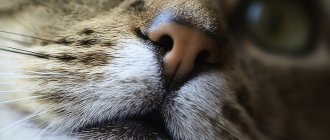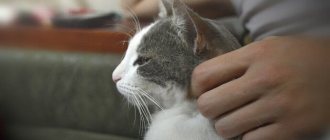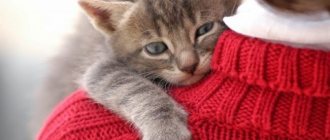8856Pavel
Cats, like dogs, have lived next to us for many centuries. These outwardly cute, proud and self-sufficient animals are endowed with special abilities - they clearly react to changes occurring in the external environment, and are excellent hunters and observers. The pet evaluates changes in a person’s mood, understands that he is ill or is experiencing emotional problems. Can cats sense their owner's pregnancy? Most owners of furry “roommates” answer this question only in the affirmative.
Why do cats react to pregnancy? To obtain an answer, several criteria must be considered :
- changes in a woman’s physical condition during pregnancy;
- instability of mood and changed emotionality, anxiety of the expectant mother;
- actions related to the purchase of children's things and arrangement of the apartment.
© shutterstock
Does the cat understand that there is a child there?
Seeing the special behavior of her cat, a pregnant woman, to whom he constantly tries to lie on his stomach, involuntarily wonders whether cats sense pregnancy, or is it just a trick of the imagination. This has not been scientifically proven, but the pet’s reaction speaks for itself. The fact that the purr senses the presence of the baby is indicated by the following features in his behavior:
- very careful movements when being held in the arms of a pregnant woman;
- the desire to press against the stomach precisely in the area of the uterus;
- rumbling and rubbing the muzzle on the stomach;
- the desire to settle on the pregnant woman’s belly when the baby is very active.
Anyone who keeps cats immediately sees that their pets’ manners change noticeably during the owner’s pregnancy. Even the least affectionate cats suddenly become completely different. They constantly huddle close to the woman and try to spend as much time as possible next to her growing belly. There is no exact answer why a cat lies on a pregnant woman’s stomach.
What happens in a woman's body
A cat can feel its owner's pregnancy early, in the first months, weeks, even days after conception. Such insight is understandable, because special processes occur in a woman’s body, which are expressed by noticeable physiological changes :
- hormonal changes occur with signs of toxicosis - nausea, vomiting, reactions from the digestive system and intestines;
- body temperature rises slightly;
- the frequency of urination changes, the urine acquires a different smell;
- vaginal discharge becomes profuse.
Pets can't help but notice these bright signs. It is at such times that they become restless, try to accompany their owner, lie down next to her, and like to climb onto her stomach. They purr intensely and perform a “massage” with their paws.
The unborn baby is actively developing, while the woman’s belly is growing, inside of which a heartbeat can be heard and the activity of the fetus is felt. At the same time, the pregnant woman’s gait and movements become cautious and measured, her breathing quickens, and shortness of breath appears. Cats feel these metamorphoses. Animals have a developed natural curiosity; the pet watches what is happening with interest and accompanies the woman. Lie down next to him, listen, purr loudly and start rubbing his stomach - the favorite actions of most furry apartment dwellers.
Some cats negatively perceive the new state of their owner and regularly confirm their disagreement with her new situation with their actions - they show aggression, attack and hiss. Experts are inclined to explain this behavior by the animal’s fear of being expelled from its home, not being fed, as something incomprehensible is happening in the life of its owner.
© shutterstock
Desire to communicate
Why do cats leave home to die, sensing their demise?
Also, such a pose may mean that the pet is not averse to communicating at a given moment in time. By exposing his tummy, he seems to be communicating that he can now be stroked and played with. If at other times the cat behaves independently and dodges its owner’s hands, then, lying on its back, it absolutely doesn’t mind playing and you don’t have to worry that the animal will bite or scratch.
Why do they do this
Despite all the mysticism of cats, quite material explanations can always be found for their behavior - perhaps they will somewhat disappoint those who want miracles and fairy tales.
Looking for warmth
All cats are very thermophilic. Their normal body temperature is one and a half to two degrees higher than ours, and for the animal to feel comfortable, the room must be at least 23–25 degrees Celsius. So they find a warm place for themselves: if not on a hot radiator or a windowsill warmed by the sun, then on a working computer.
And since cats are also great lovers of sleep - some of them are ready to sleep up to 20 hours a day - then the choice of the owner’s bed becomes obvious: warm, cozy and not drafty.
They say that cats often lie down on sore spots. Yes this is true. And it is also simply explained: the cat does not so much warm your sore joints, for example, as it warms itself about them. She chooses for herself the warmest areas of the human body - and where the inflammatory process occurs, the temperature naturally rises.
The same thing happens with pregnancy. From the moment of conception, turbulent events unfold in a woman’s uterus: rapid cell division occurs, the entire reproductive system is rebuilt. Of course, at the same time the stomach becomes warmer than usual - and that’s all the cat needed.
Changes in well-being as a sign of imminent labor
The approaching birth can be judged from the physiological changes and well-being of the expectant mother. The most reliable indicator is body temperature. Taking into account the total period of 63 days, from about 60 days the pet will begin to decrease. In about two days, body temperature will drop by 2 degrees and can reach 37–37.1 degrees Celsius.
Take rectal body temperature measurements no more than once a day.
About a week before giving birth, the body begins to actively prepare for the arrival of babies. You may notice that your cat's nipples have become enlarged. Quite often, the pet begins to pay more attention to licking the belly and mammary glands, this stimulates the uterus and the cervix to the natural beginning of the birth process.
A few days before giving birth, enlargement of the loop and mammary glands in a pregnant cat become obvious.
It may take 12–24 hours from the start of contractions until the kittens are born. At this stage, you may notice changes in your cat's breathing. Place your palm on the pet's chest if you feel that the expectant mother's breathing has become less deep and frequent - this is a sign of the onset of contractions. Cats with short, depressed noses may experience hypoxia (oxygen starvation), so carefully monitor the color of the mucous membranes and general health.
Note! During the moment of strong contractions and attempts, the cat can breathe with its mouth open - this is the norm.
About a day before birth, the uterus becomes toned and no longer softens before the onset of contractions. If, when palpating and stroking, you feel that the abdominal muscles are very tense, this is a sign of imminent labor. During contractions, the peritoneum tenses and relaxes; at the first stage, intervals can reach up to 30-40 minutes. During frequent contractions and pushing, the cat experiences severe pain and lies on its side.
Why does a cat lie on its stomach: reasons
The animal can do this because it has rested on its owner before.
Popular signs see the fact that a cat or kitten walks on a pregnant woman as a negative omen, but veterinarians identify the following main reasons for the animal’s interest:
- Treatment. Studies confirm that cats relieve negative symptoms of diseases and have an analgesic effect. In pregnant women, overstrain of the uterine muscles is relieved, pain from stretching goes away and the functioning of the gastrointestinal tract is normalized.
- The desire to warm up. Representatives of the cat family love warmth and want to snuggle up to a hot body.
- Habit. If cats sleep on their owner all their lives, they will continue to rest on the pregnant woman’s belly.
- Trying to calm the child down. If the baby pushes, the pet specifically begins to lull him to sleep by purring.
- To attract attention. A pregnant woman has little time for her pet, so it reminds her of herself.
Return to contents
When a cat realizes that its owner is pregnant
Cats do not outwardly notice that the owner’s position has changed. They can feel that a woman is pregnant even before she herself finds out about her situation. If, after the owner had unprotected sexual intercourse, the cat suddenly began to pay special attention to her stomach, it is worth doing a pregnancy test. Very often, the cat begins to communicate with the baby early, from the first days of his development.
© shutterstock
What serves as a signal for the animal is unknown. It is difficult to determine whether cats feel that a person has undergone hormonal changes, record even minor deviations from their usual behavior, or directly feel a new life. However, most owners can say one thing for sure: even if a pregnant woman comes to visit, the cat, no matter how unsociable, appears and tries to settle on its lap and lie near its stomach.
Preparing a cat for the birth of a baby
We talk all the time about cats "knowing" you're pregnant, but that implies cognitive awareness that they simply don't possess. (Yes, your cat is the smartest cat we know, but she still doesn't understand what's going on.)
Your cat just knows that things are different—and, unfortunately for your cat, things will be even more different when your baby is born. To prepare your cat for the upcoming changes, follow these steps:
- Introduce baby items and move furniture around the house slowly, especially if you plan to dislodge the cat from her favorite places. You need to get her used to cribs and booster seats without filling the whole house at once.
- Start playing recordings of baby noises, especially babies crying. These sounds can be stressful for cats, and you don't want her to associate them directly with the arrival of the baby.
- Start blocking off the room your baby will sleep in and place barriers or tape (cats hate sticky surfaces!) around the crib to prevent your cat from thinking the crib is an appropriate place to sleep.
- Make a plan to introduce your cat to your baby when he is born. It's wise to let your cat get used to your baby's scent by introducing her to a blanket or piece of clothing from the hospital. Next, make sure that all formal introductions are strictly supervised and your cat is never left alone with your baby.
Keep in mind that stress can have negative effects—both behaviorally and physiologically—on all cats, especially those with pre-existing health problems such as chronic pain.
Watch for new vomiting, diarrhea, or eating behavior (such as refusing to eat), as these may be signs that your cat needs to be seen by a veterinarian.
Signs - true and absurd
A number of signs are associated with the behavior of a cat during the owner’s pregnancy:
- The animal, lying on its “pregnant” belly, protects the unborn baby from illness and lulls it to sleep .
There is some truth here: many women note that such “therapy” helps the fetus calm down - reduce its strong tremors, and also reduce the tone of the uterus. If the expectant mother has toxicosis, the cat, like a heating pad, will calm her down too - If a cat lies on its stomach, then something bad will happen to the fetus .
This sign contradicts the previous one and, of course, does not correspond to reality. Even a heavy cat will not crush the baby, because he is reliably protected by the stomach and amniotic fluid. Probably, the sign that a cat on the stomach can harm the baby has a logical basis simply in the fact that during pregnancy it is recommended not to put pressure on the stomach - If a pet tries to move from the belly to the chest, this can spoil the milk .
The sign is absurd - the animal will not affect the lactation process in any way. When he presses himself against a human breast, he simply expresses his affection, asks for attention and affection. In addition, if the belly is already large, it is simply uncomfortable for the cat to lie on it, and it descends to a flatter place. When a cat clings to its owner's chest, it demonstrates its affection and asks for reciprocal affection. - You cannot suddenly drive a cat away from its belly .
In general, this is justified, because sudden movements are generally undesirable for a pregnant woman. In addition, the mother’s emotional reaction is also important here: even fleeting excitement is transmitted to the fetus. Finally, it is worth remembering that a cat may be frightened by a scream or sudden movements and release its claws into the stomach. to hold on - but this is definitely useless. To prevent the cat from scratching the expectant mother, you can put veterinary silicone caps on her claws
Are cats dangerous for pregnant women?
Should you give away or not give away your beloved cat if you are expecting a baby? Many women, having read about the horrors of toxoplasmosis, urgently get rid of their pet. Yes, this disease is carried by cats, and its causative agent is very dangerous for the fetus, which can suffer serious pathologies or even die. But, firstly, you can get toxoplasmosis not from a cat, but from contaminated meat, fish or eggs, or even just by poking around in a garden bed where there are toxoplasma microparasites in the soil.
Secondly, at least half of adults, according to doctors, have already had toxoplasmosis asymptomatically, without even noticing it, and are immune. Thirdly, your cat is not necessarily a carrier of the disease - this can be easily found out by taking her to the veterinarian. Well, it’s generally better to follow the rules of basic hygiene, and not only for pregnant women - in this case, no infection will overcome you.
Having a cat examined by a veterinarian will certainly not harm either the cat or the pregnant owner.
So you will deal with this phobia yourself and, most likely, in favor of the cat. It’s another matter if a woman develops an allergy while expecting a baby. The expectant mother, when a cat sleeps on her stomach, sneezes and coughs, swelling and rashes form. This situation is really dangerous for a child, and indeed, sad as it may be, you will have to find kind, caring hands for your cat.
Be more attentive to your pet, and then its behavior can tell you a lot. This is really very interesting. But to believe or not to believe in omens is something only the woman herself can decide. Especially if she is pregnant.
Cats have been accompanying humans since ancient times, sharing their sorrows and joys. During pregnancy, the owner is often puzzled by the question of why her furry pet tries to lie on her stomach. What does it mean? Does the pet know about the baby?
Cats and your hormonal changes
There's nothing more synonymous with pregnancy than hormones.
Essentially, they make pregnancy possible, maintain it for 9 months, and then (probably) induce labor in a series of still-mysterious changes that lead to the birth of your baby. Rising hormone levels during pregnancy are also responsible for most of your symptoms, such as morning sickness, fatigue, pelvic pain and food cravings. You are particularly influenced by the following hormones:
- HCG, also known as human chorionic gonadotropin . This hormone is produced by cells of the placenta. Because your levels are very high in early pregnancy, hCG is used to confirm pregnancy through urine and blood tests.
- Prolactin and relaxin . Prolactin helps produce breast milk, and relaxin affects the muscles of the uterus and pelvic joints. Although both of these factors are important for labor, they begin to increase in early pregnancy.
- Progesterone . This hormone energizes your uterus before pregnancy and helps maintain a healthy pregnancy after fertilization.
- Estrogen . During pregnancy, estrogen works wonders: it regulates other hormones, helps the baby develop, regulates blood flow and causes milk ducts to form.
There is no evidence that pregnancy hormones cause you to smell anything, but we do know that other body substances, such as pheromones and hormones that are released during puberty, can produce subtle (and not-so-subtle) odors, so that this is possible.
But can cats detect these odors? Well, we don't know that either. There's no doubt that cats have super-strong olfactory senses: According to PAWS Chicago, cats have about 200 million olfactory receptors in their noses, compared to our measly 5 million.
This doesn't mean they can detect any hypothetical odors caused by pregnancy hormones. But if these odors do exist, a cat's nose could theoretically detect them.











